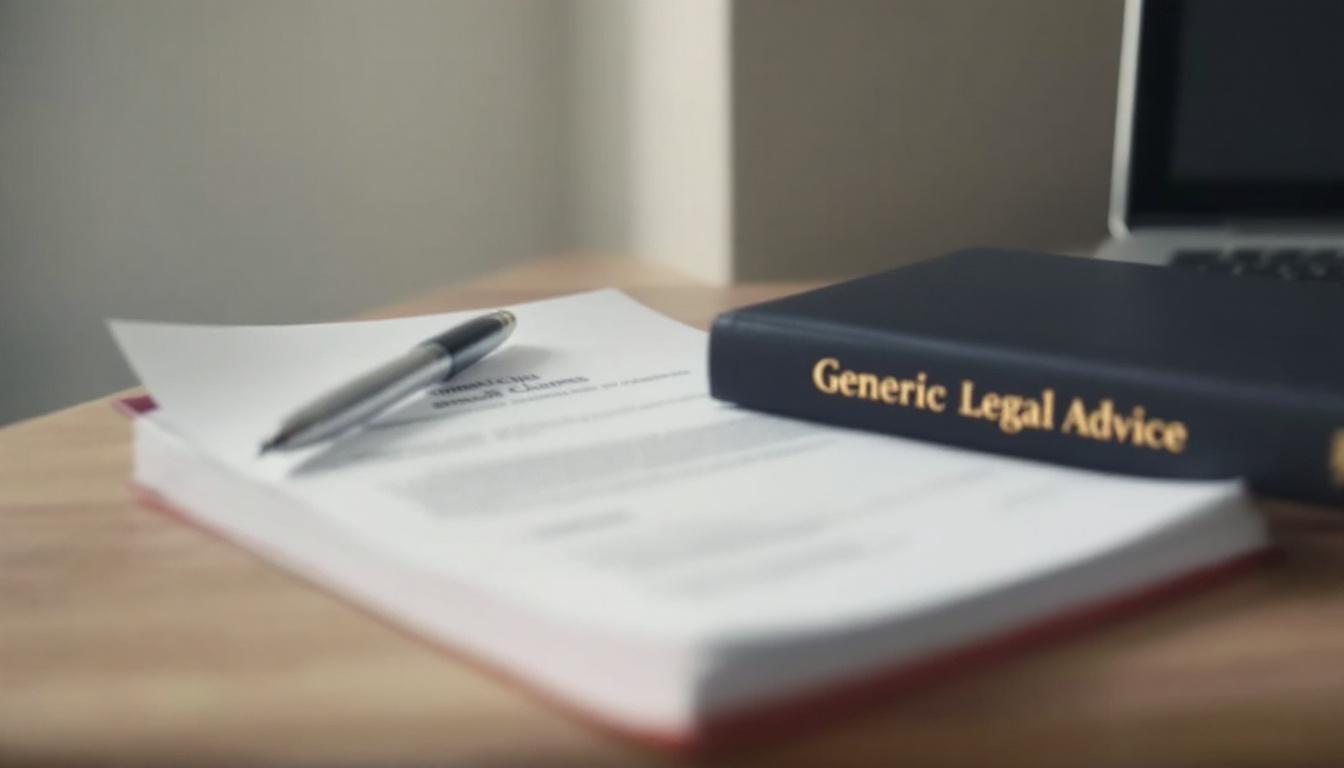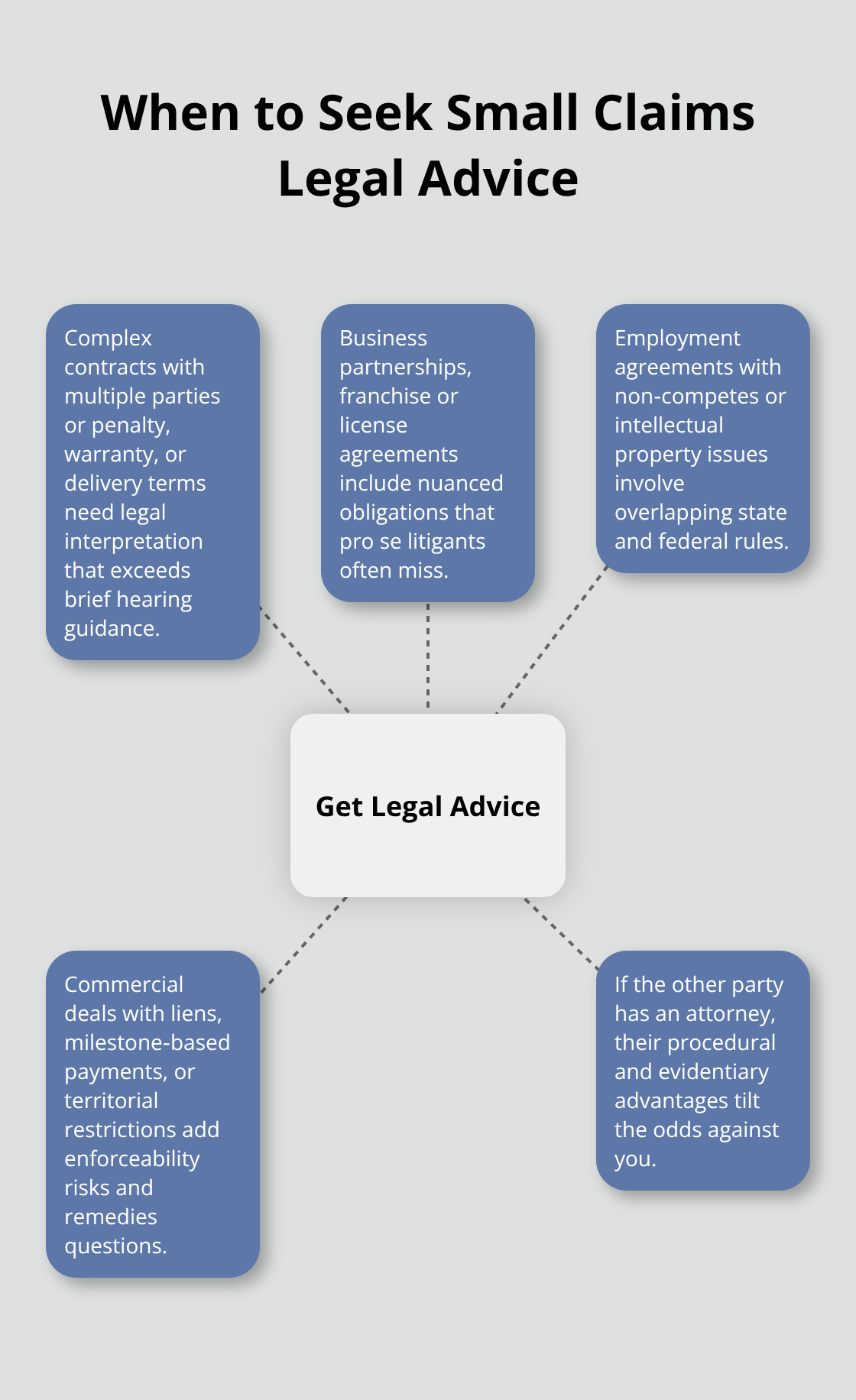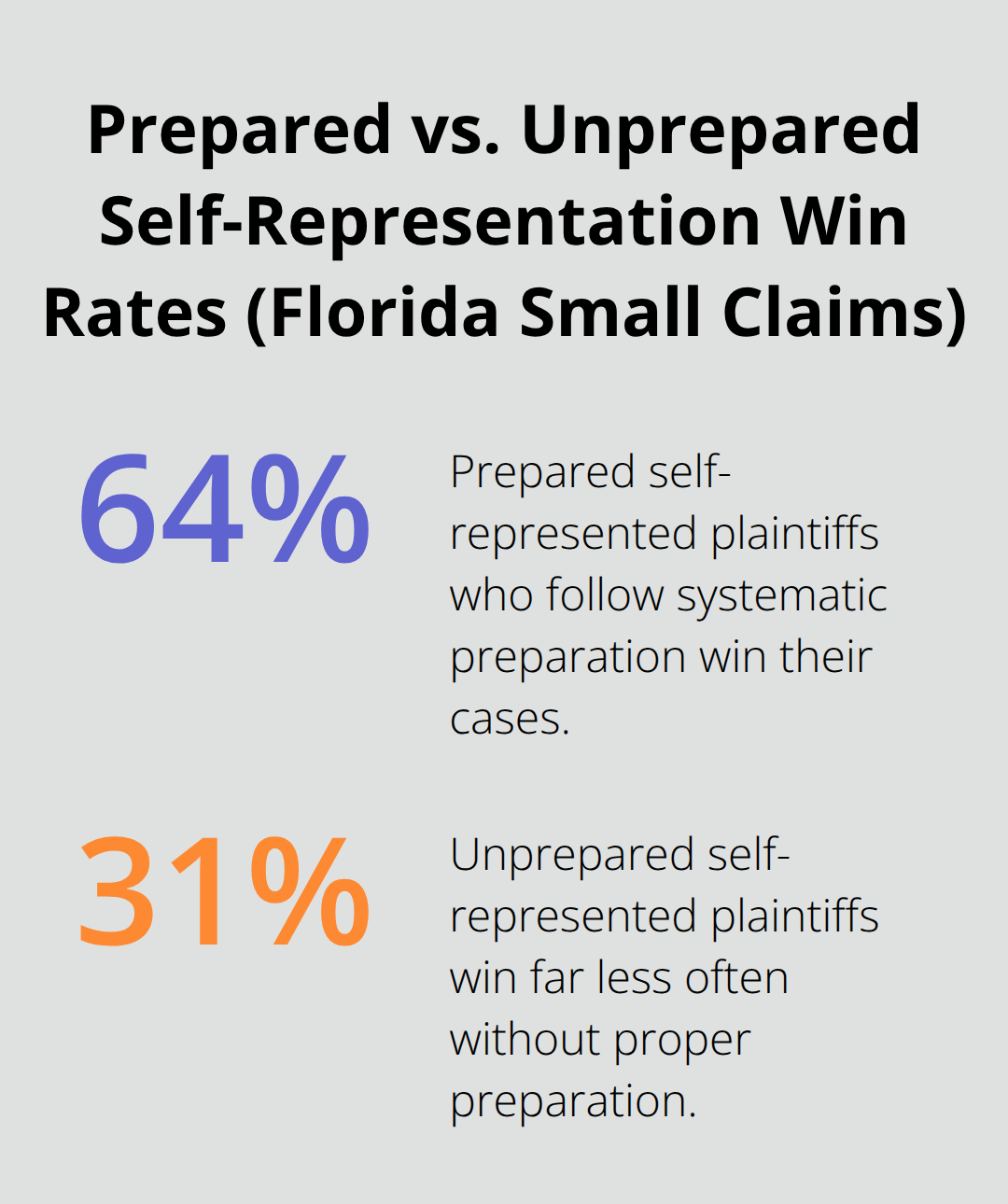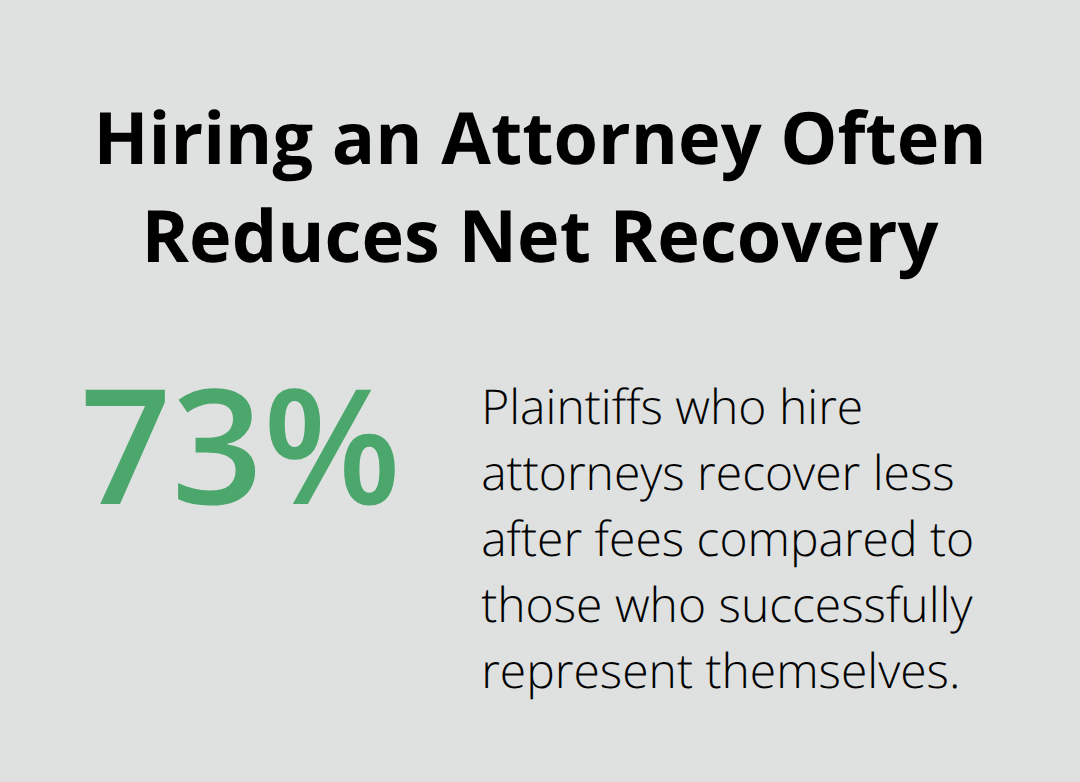Small Claims Court: Do You Need Legal Advice?
Our Blog
Small Claims Court: Do You Need Legal Advice?

Small claims court handles disputes under $8,000 in Florida, but deciding whether you need small claims legal advice isn’t always straightforward. Many people assume they can handle these cases alone.
We at Harnage Law PLLC see situations where self-representation works well, and others where legal guidance makes the difference between winning and losing your case.
When You Need Legal Advice in Small Claims Court
Most small claims cases with straightforward money disputes work fine without an attorney. However, three specific situations change this calculation completely. Contract disputes with multiple parties or complex terms require legal interpretation that goes beyond what judges can explain during brief hearings. Business partnership dissolutions, license agreements, or franchise disputes contain legal nuances that self-represented litigants typically miss. Employment contract violations with non-compete clauses or intellectual property issues fall into this category too.

Complex Legal Issues Beyond Simple Money Disputes
Contract interpretation becomes challenging when disputes involve penalty clauses, warranty terms, or delivery schedules with liquidated damages. Florida business law requires understanding of specific statutory requirements that affect contract enforceability. Multiple documents, cross-claims, and potential counterclaims often overwhelm self-represented parties in these scenarios.
Employment disputes present another layer of complexity. Non-compete agreements, intellectual property violations, and wage disputes with commission structures require legal analysis that goes beyond basic contract law. These cases often involve federal and state employment regulations that interact in ways most people don’t understand.
Cases with Business Contracts or Commercial Relationships
Commercial relationships create the most challenging small claims scenarios. Construction contracts with lien rights, supplier agreements with payment terms tied to performance milestones, or license deals with territorial restrictions need legal analysis. Service agreements with penalty clauses require interpretation of warranty terms and disputes over delivery schedules with liquidated damages.
Florida courts handle thousands of business disputes annually, and self-represented parties lose these cases at higher rates than simple debt collection matters. The legal framework becomes complex when your dispute involves breach of service agreements, interpretation of warranty terms, or disputes over delivery schedules (particularly those with liquidated damages provisions).
Situations Where the Other Party Has Legal Representation
The moment the other party hires an attorney, your odds of success drop significantly without legal representation. Attorneys know procedural rules, evidence standards, and legal arguments that give them substantial advantages. They understand how to object to inadmissible evidence, present compelling legal theories, and navigate court procedures efficiently.
Statistics from Florida courts show that represented parties win approximately 78% of cases against self-represented opponents. This disparity exists because attorneys prepare stronger cases, present evidence more effectively, and understand legal standards that judges apply. When you face legal representation, the playing field becomes uneven in ways that affect your case outcome.
Understanding when you need legal help sets the foundation for your next decision: whether to represent yourself effectively or hire an attorney. A consumer dispute attorney can provide essential services including legal research, contract negotiations, and mediation support for complex cases.
How to Represent Yourself Effectively in Small Claims Court
Self-representation in small claims court demands three non-negotiable elements: bulletproof documentation, procedural knowledge, and strategic case presentation. Florida courts process over 200,000 small claims cases annually, and self-represented plaintiffs who follow systematic preparation win 64% of their cases compared to only 31% for those who approach cases without proper preparation.

Gather and Organize Your Evidence and Documentation
Your evidence collection determines your case outcome more than courtroom performance. Florida small claims courts require original contracts, receipts, photographs, and written communications as primary evidence. Email chains, text messages, and payment records carry more weight than verbal testimony.
Create a chronological file with dates, amounts, and parties involved for every transaction. Courts reject hearsay evidence, so witness statements must be notarized affidavits or live testimony. Take photographs of damaged property immediately after incidents occur, as delayed documentation loses credibility.
Bank statements, canceled checks, and credit card records provide irrefutable proof of payments or damages. Organize these documents in clear folders with tabs for easy reference during your presentation.
Understanding Small Claims Court Procedures and Rules
Florida small claims procedures follow strict timelines that self-represented parties often miss. File your claim within four years for contract disputes and two years for property damage under Florida Statutes Section 95.11. Serve the defendant properly through certified mail or process servers (improper service dismisses your case automatically).
Arrive 30 minutes early to observe other cases and understand the judge’s style. Address the judge as Your Honor and present facts chronologically without emotional commentary. Florida judges limit presentations to 10-15 minutes per side, so practice a concise summary that hits key points: what happened, when it occurred, damages incurred, and relief requested.
Bring three copies of all documents for the judge, defendant, and your records.
Prepare Your Case Presentation and Arguments
Successful self-representation requires you to treat small claims court like a business presentation. Start with a one-sentence summary of your claim, then present evidence in logical order that supports each element. Florida courts focus on factual disputes, not legal theories, so stick to what, when, where, and how much.
Respond directly to judge questions without volunteering additional information. If the defendant makes counterclaims, address them specifically with evidence rather than general denials. Calculate your damages precisely including filing fees, service costs, and lost wages if applicable.
Request specific monetary amounts rather than ask the judge to decide appropriate compensation. Practice your presentation beforehand to stay within time limits and maintain professional composure.
The strength of your self-representation often depends on understanding what you’re up against financially and strategically, which leads directly to evaluating whether attorney fees justify the potential benefits in your specific situation.
Costs and Benefits of Hiring an Attorney for Small Claims Cases
Attorney fees for small claims cases typically range from $200 to $500 per hour in Florida, while the maximum recovery amount sits at $8,000. This creates a mathematical problem that most people ignore: hiring an attorney for a $2,000 dispute means paying $800 to $1,200 in legal fees for basic case preparation and court appearance.
The economics only work when your potential recovery exceeds $4,000 or when complex legal issues require professional analysis. Florida Bar Association data shows that 73% of small claims plaintiffs who hire attorneys recover less money after fees than those who represent themselves successfully.

Attorney Fees Versus Potential Recovery Amounts
Small claims cases with potential recoveries under $3,000 rarely justify attorney costs. Legal fees consume 30% to 60% of your award in these lower-value disputes. Cases worth $5,000 or more shift this calculation significantly (attorney fees represent 15% to 25% of recovery amounts).
Business contract disputes and employment cases often involve higher stakes that make legal representation financially viable. Complex liability issues or multiple defendants increase case value beyond simple debt collection matters. Calculate total legal costs including consultation fees, document review, and court appearance time before making this decision.
Time Investment Required for Self-Representation
Self-representation demands 15 to 25 hours of preparation time for straightforward cases, including document organization, legal research, and court appearances. Complex cases require 40 to 60 hours of work spread across several weeks.
Florida courts schedule hearings during business hours, forcing most people to take unpaid time off work. Calculate your hourly wage multiplied by preparation time plus lost work income to determine your true self-representation costs. Many people underestimate this time investment and arrive unprepared, which explains why 69% of unprepared self-represented parties lose their cases.
Risk Assessment of Losing Your Case Without Legal Help
Statistical analysis from Florida small claims courts reveals that self-represented parties win 64% of cases when properly prepared, but only 31% when facing attorney representation. The financial risk calculation becomes simple: multiply your potential recovery by your estimated win probability, then subtract preparation costs.
Cases involving contract interpretation, business disputes, or represented opponents shift the risk-reward ratio toward hiring legal counsel. Attorney representation becomes necessary when the opposing party has legal counsel, as the statistical advantage justifies the expense in these scenarios.
Final Thoughts
Your decision about small claims legal advice depends on three factors: case complexity, financial stakes, and opposing party representation. Simple debt collection or property damage cases under $3,000 work well with self-representation when you have solid documentation and time to prepare properly. Complex business contracts, employment disputes, or cases where the other party has an attorney shift the equation toward professional legal help.
The 78% win rate for represented parties against self-represented opponents makes this choice clear in contested cases. Calculate your total costs (preparation time, lost wages, and potential attorney fees) against your expected recovery. Cases worth $5,000 or more with complex legal issues justify professional representation, while straightforward disputes under $3,000 favor self-representation.
We at Harnage Law PLLC handle civil litigation matters across Florida and understand when small claims cases require professional legal analysis. Take action based on your specific situation rather than general assumptions. Contact Harnage Law PLLC for consultation if your case involves business contracts, multiple parties, or represented opponents where professional legal guidance protects your financial interests.
